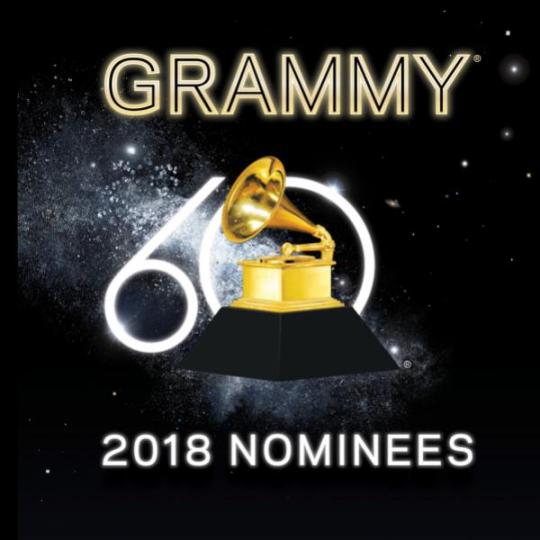#nyugenerasian

So, the 60th Annual Grammy Nominations were announced yesterday morning, and somehow it left me with more mixed emotions than I’ve felt in a long time. On the one hand, we have many reasons to celebrate this year–the 2018 list of nominees is the most diverse group in all of Grammy history, especially when it comes to Black and LGBTQIA inclusion. Jay-Z, Childish Gambino, Kendrick Lamar, and more were all (deservedly) nominated for record of the year. Kesha and Lady Gaga were both nominated for two Grammys each, and out songwriter Justin Tranter was nominated for his first award as well.
When it comes to inclusion in the entertainment industry, we’ve come a long way, and these nominees are just one example of that. Unfortunately, this progress has not been reflected within the Asian American community, as you can clearly see by the lack of Asian nominees for the 2018 Grammys. I can’t say I’m surprised, considering there aren’t really any huge Asian American names in the music industry. But it’s not because we’re not trying–it’s because those who run the system aren’t listening.This year I got the chance to discover Alice Gao,Niki Zefanya,Yaeji, and several other incredible Asian artists whose music deserves recognition–but none of them are getting the attention they deserve.
While Grammy nomination entries can by submitted by any artists/record companies with commercially released music, all submissions are reviewed by a group of over 350 experts in the fields of jazz, R&B, rock, classical, new age, and more. These experts within the Academy go through several rounds of screening, being advised to vote in up to 15 categories in their areas of expertise as well as the 4 general categories (Record of The Year, Album of the Year, Song of The Year, and Best New Artist). Unfortunately, if you are a lesser known artist in the US (aka most Asian American artists) signed to a label with more well known artists, your label will most likely submit their song/album to be considered for Grammy nomination over yours. At the end of the day, it’s pretty much a self fulfilling prophesy. Since Asian American artists are almost never well known enough to qualify for the final rounds of nomination, their work is not often submitted. As a result, Asian Americans are continuously left out of the mainstream. The whole thing is a cycle that seems to have no end.
Don’t get me wrong, I believe we should celebrate the victories we achieve, but I’m honestly so tired of writing and complaining about Asian American representation. You guys have heard it all before and I’m not here to preach the same message all over again, but my soul is tired y’all. While we should celebrate and cheer on our fellow POC, let’s remember that the entertainment industry is still far, far, from being the all inclusive community that we so desperately need.
Image via grammys.com

You may not have heard of 88Rising, but you’ve probably listened to Dat$tick by Rich Chigga at least once or twice; well, the label behind Rich Chigga’s creative genius is 88Rising, an NYC based music label founded by Sean Miyashiro.
Over the months, 88Rising has gotten more and more spotlight—not only for curating incredible music, but also for giving Asian artists some of the attention they deserve. When Dat $tick went viral, Rich Chigga got the stamp of approval from tons of US rappers, such as Migos, 21 Savage, and more. From there, things have only gone up.
88Rising partnered with The Higher Brothers, a Chengdu based rap group who is breaking barriers in a musical and physical way. Because they don’t have direct access to YouTube in China, they have to work extra hard to interact with their fans, but they do it because it’s all worth it. They have a true appreciation for rap culture that transcends geography and language; for their fans it’s about the flow, the delivery, and the charisma.
88Rising’s Sean manages all of these artists and more, not just because they’re Asian, but because he believes in their music. He told Pitchfork, “Real talk, from a music perspective, if I don’t fuck with it, just ‘cause it’s from the Philippines, I’m not gonna put it up. I think that 1000 percent of the time, the music needs to be good.” And his philosophy shows, too. They recently debuted Indonesian singer NIKI, an R&B artist whose style is characterized by smooth and heavy beats. She’s young, but her potential is definitely there.
In many ways, 88Rising is exactly what the Asian community needs. They obviously want to bring attention to the real talent thats brewing all over Asia, but more than that it’s also about putting out music that’s truly worthwhile. In that way, they’re paving a way for Asian artists to be taken seriously in the music industry. Check out the video below to see some of our favorite rappers reacting to the Higher Brothers and click here to see more of 88Rising’s YouTube content.
No, I am not American, I’m from Hong Kong. But yes, I do know how to speak English. My Asian appearance and profile probably threw you off there, as you were probably expecting me to sound “international”. Within less than a week of college, I have had to explain to numerous people why don’t I have an ‘accent’ — well, what they consider an ‘accent’, that is.
I don’t have an “accent” because I learned English my whole life and was taught by American/British teachers. But I mean, isn’t an American accent still an accent too? It seems that someone who speaks with correct grammar and vocabulary can be judged based on their foreign sounding vowels. Sometimes, I wonder whether I should take it as a compliment or an insult when I get comments on my ‘lack of an accent’.
There seems to be a common misconception that if you don’t come from the West, you must speak broken English. Yet, it’s hard to judge one’s language ability based solely on where they’re from. In fact, Hong Kong was a British colony for over 150 years, which makes English one of the official languages. Thus, not knowing the history and culture of a place unfamiliar to you and making baseless comments can make you look ignorant.
Sometimes, we think we’re complimenting someone without realizing the superficial assumptions that we are making. With that, I want to encourage you to step out of your personal bubble of thoughts and think about the implications of what you’re about to say–even if you think it’s a compliment. After all, our perceptions of truth may not always be true, and the last thing we’d want to do is to offend anyone when we never intended to.
